- Home
- H. P. Lovecraft
Other Gods and More Unearthly Tales Page 9
Other Gods and More Unearthly Tales Read online
Page 9
“Carter—hurry! It’s no use—you must go—better one than two—the slab—” A pause, more clicking, then the faint voice of Warren:
“Nearly over now—don’t make it harder—cover up those damned steps and run for your life—you’re losing time—So long, Carter—won’t see you again.” Here Warren’s whisper swelled into a cry; a cry that gradually rose to a shriek fraught with all the horror of the ages—
“Curse these hellish things—legions—My God! Beat it! Beat it! Beat it!”
After that was silence. I know not how many interminable aeons I sat stupefied; whispering, muttering, calling, screaming into that telephone. Over and over again through those aeons I whispered and muttered, called, shouted, and screamed, “Warren! Warren! Answer me—are you there?”
And then there came to me the crowning horror of all—the unbelievable, unthinkable, almost unmentionable thing. I have said that aeons seemed to elapse after Warren shrieked forth his last despairing warning, and that only my own cries now broke the hideous silence. But after a while there was a further clicking in the receiver, and I strained my ears to listen. Again I called down, “Warren, are you there?,” and in answer heard the thing which has brought this cloud over my mind. I do not try, gentlemen, to account for that thing—that voice—nor can I venture to describe it in detail, since the first words took away my consciousness and created a mental blank which reaches to the time of my awakening in the hospital. Shall I say that the voice was deep; hollow; gelatinous; remote; unearthly; inhuman; disembodied? What shall I say? It was the end of my experience, and is the end of my story. I heard it, and knew no more. Heard it as I sat petrified in that unknown cemetery in the hollow, amidst the crumbling stones and the falling tombs, the rank vegetation and the miasmal vapours. Heard it well up from the innermost depths of that damnable open sepulchre as I watched amorphous, necrophagous shadows dance beneath an accursed waning moon. And this is what it said:
“YOU FOOL, WARREN IS DEAD!”
THE TREE
“The Tree” was probably written in the spring of 1920. Generally considered a “Dunsanian” story, probably because of its mellifluous prose, it is an anomaly in being set in ancient Greece. Very few of Dunsany’s works are set there, with the exception of the play Alexander (1912). The historical details Lovecraft provides allow us to date the story fairly precisely to a period in the mid-fourth century bce. Lovecraft had actually devised the plot as early as 1918, before he ever read Dunsany. The story first appeared in the Tryout (October 1921).
“Fata viam invenient.”
ON A VERDANT SLOPE OF MOUNT MAENALUS, IN ARCADIA, THERE STANDS an olive grove about the ruins of a villa. Close by is a tomb, once beautiful with the sublimest sculptures, but now fallen into as great decay as the house. At one end of that tomb, its curious roots displacing the time-stained blocks of Pentelic marble, grows an unnaturally large olive tree of oddly repellent shape; so like to some grotesque man, or death-distorted body of a man, that the country folk fear to pass it at night when the moon shines faintly through the crooked boughs. Mount Maenalus is a chosen haunt of dreaded Pan, whose queer companions are many, and simple swains believe that the tree must have some hideous kinship to these weird Panisci; but an old beekeeper who lives in the neighbouring cottage told me a different story.
Many years ago, when the hillside villa was new and resplendent, there dwelt within it the two sculptors Kalos and Musides. From Lydia to Neapolis the beauty of their work was praised, and none dared say that the one excelled the other in skill. The Hermes of Kalos stood in a marble shrine in Corinth, and the Pallas of Musides surmounted a pillar in Athens, near the Parthenon. All men paid homage to Kalos and Musides, and marvelled that no shadow of artistic jealousy cooled the warmth of their brotherly friendship.
But though Kalos and Musides dwelt in unbroken harmony, their natures were not alike. Whilst Musides revelled by night amidst the urban gaieties of Tegea, Kalos would remain at home; stealing away from the sight of his slaves into the cool recesses of the olive grove. There he would meditate upon the visions that filled his mind, and there devise the forms of beauty which later became immortal in breathing marble. Idle folk, indeed, said that Kalos conversed with the spirits of the grove, and that his statues were but images of the fauns and dryads he met there—for he patterned his work after no living model.
So famous were Kalos and Musides, that none wondered when the Tyrant of Syracuse sent to them deputies to speak of the costly statue of Tyché which he had planned for his city. Of great size and cunning workmanship must the statue be, for it was to form a wonder of nations and a goal of travellers. Exalted beyond thought would be he whose work should gain acceptance, and for this honour Kalos and Musides were invited to compete. Their brotherly love was well known, and the crafty Tyrant surmised that each, instead of concealing his work from the other, would offer aid and advice; this charity producing two images of unheard-of beauty, the lovelier of which would eclipse even the dreams of poets.
With joy the sculptors hailed the Tyrant’s offer, so that in the days that followed their slaves heard the ceaseless blows of chisels. Not from each other did Kalos and Musides conceal their work, but the sight was for them alone. Saving theirs, no eyes beheld the two divine figures released by skilful blows from the rough blocks that had imprisoned them since the world began.
At night, as of yore, Musides sought the banquet halls of Tegea whilst Kalos wandered alone in the olive grove. But as time passed, men observed a want of gaiety in the once sparkling Musides. It was strange, they said amongst themselves, that depression should thus seize one with so great a chance to win art’s loftiest reward. Many months passed, yet in the sour face of Musides came nothing of the sharp expectancy which the situation should arouse.
Then one day Musides spoke of the illness of Kalos, after which none marvelled again at his sadness, since the sculptors’ attachment was known to be deep and sacred. Subsequently many went to visit Kalos, and indeed noticed the pallor of his face; but there was about him a happy serenity which made his glance more magical than the glance of Musides—who was clearly distracted with anxiety, and who pushed aside all the slaves in his eagerness to feed and wait upon his friend with his own hands. Hidden behind heavy curtains stood the two unfinished figures of Tyché, little touched of late by the sick man and his faithful attendant.
As Kalos grew inexplicably weaker and weaker despite the ministrations of puzzled physicians and of his assiduous friend, he desired to be carried often to the grove which he so loved. There he would ask to be left alone, as if wishing to speak with unseen things. Musides ever granted his requests, though his eyes filled with visible tears at the thought that Kalos should care more for the fauns and the dryads than for him. At last the end drew near, and Kalos discoursed of things beyond this life. Musides, weeping, promised him a sepulchre more lovely than the tomb of Mausolus; but Kalos bade him speak no more of marble glories. Only one wish now haunted the mind of the dying man; that twigs from certain olive trees in the grove be buried by his resting-place—close to his head. And one night, sitting alone in the darkness of the olive grove, Kalos died.
Beautiful beyond words was the marble sepulchre which stricken Musides carved for his beloved friend. None but Kalos himself could have fashioned such bas-reliefs, wherein were displayed all the splendours of Elysium. Nor did Musides fail to bury close to Kalos’ head the olive twigs from the grove.
As the first violence of Musides’ grief gave place to resignation, he laboured with diligence upon his figure of Tyché. All honour was now his, since the Tyrant of Syracuse would have the work of none save him or Kalos. His task proved a vent for his emotion, and he toiled more steadily each day, shunning the gaieties he once had relished. Meanwhile his evenings were spent beside the tomb of his friend, where a young olive tree had sprung up near the sleeper’s head. So swift was the growth of this tree, and so strange was its form, that all who beheld it exclaimed in surprise; and Musides se
emed at once fascinated and repelled.
Three years after the death of Kalos, Musides despatched a messenger to the Tyrant, and it was whispered in the agora at Tegea that the mighty statue was finished. By this time the tree by the tomb had attained amazing proportions, exceeding all other trees of its kind, and sending out a singularly heavy branch above the apartment in which Musides laboured. As many visitors came to view the prodigious tree, as to admire the art of the sculptor, so that Musides was seldom alone. But he did not mind his multitude of guests; indeed, he seemed to dread being alone now that his absorbing work was done. The bleak mountain wind, sighing through the olive grove and the tomb-tree, had an uncanny way of forming vaguely articulate sounds.
The sky was dark on the evening that the Tyrant’s emissaries came to Tegea. It was definitely known that they had come to bear away the great image of Tyché and bring eternal honour to Musides, so their reception by the proxenoi was of great warmth. As the night wore on, a violent storm of wind broke over the crest of Maenalus, and the men from far Syracuse were glad that they rested snugly in the town. They talked of their illustrious Tyrant, and of the splendour of his capital; and exulted in the glory of the statue which Musides had wrought for him. And then the men of Tegea spoke of the goodness of Musides, and of his heavy grief for his friend; and how not even the coming laurels of art could console him in the absence of Kalos, who might have worn those laurels instead. Of the tree which grew by the tomb, near the head of Kalos, they also spoke. The wind shrieked more horribly, and both the Syracusans and the Arcadians prayed to Aiolos.
In the sunshine of the morning the proxenoi led the Tyrant’s messengers up the slope to the abode of the sculptor, but the night-wind had done strange things. Slaves’ cries ascended from a scene of desolation, and no more amidst the olive grove rose the gleaming colonnades of that vast hall wherein Musides had dreamed and toiled. Lone and shaken mourned the humble courts and the lower walls, for upon the sumptuous greater peristyle had fallen squarely the heavy overhanging bough of the strange new tree, reducing the stately poem in marble with odd completeness to a mound of unsightly ruins. Strangers and Tegeans stood aghast, looking from the wreckage to the great, sinister tree whose aspect was so weirdly human and whose roots reached so queerly into the sculptured sepulchre of Kalos. And their fear and dismay increased when they searched the fallen apartment; for of the gentle Musides, and of the marvellously fashioned image of Tyché, no trace could be discovered. Amidst such stupendous ruin only chaos dwelt, and the representatives of two cities left disappointed; Syracusans that they had no statue to bear home, Tegeans that they had no artist to crown. However, the Syracusans obtained after a while a very splendid statue in Athens, and the Tegeans consoled themselves by erecting in the agora a marble temple commemorating the gifts, virtues, and brotherly piety of Musides.
But the olive grove still stands, as does the tree growing out of the tomb of Kalos, and the old beekeeper told me that sometimes the boughs whisper to one another in the night-wind, saying over and over again, “I know! I know!”
THE TEMPLE
(MANUSCRIPT FOUND ON THE COAST OF YUCATAN)
The longest story of Lovecraft’s early career, “The Temple” was apparently written in the latter half of 1920—possibly August 20, a date cited in the tale and Lovecraft’s thirtieth birthday. It is marred by somewhat clumsy and obvious satire against the German protagonist of the tale, and also by a plethora of supernatural details that do not seem to fuse into a unity; but its portrayal of the narrator’s gradual descent into madness is powerful. It was the first of Lovecraft’s stories not to appear in an amateur journal prior to its publication in a professional venue: its first appearance was in Weird Tales (September 1925).
ON AUGUST 20, 1917, I, KARL HEINRICH, GRAF VON ALTBERG-EHRENSTEIN, Lieutenant-Commander in the Imperial German Navy and in charge of the submarine U-29, deposit this bottle and record in the Atlantic Ocean at a point to me unknown but probably about N. Latitude 20°, W. Longitude 35°, where my ship lies disabled on the ocean floor. I do so because of my desire to set certain unusual facts before the public; a thing I shall not in all probability survive to accomplish in person, since the circumstances surrounding me are as menacing as they are extraordinary, and involve not only the hopeless crippling of the U-29, but the impairment of my iron German will in a manner most disastrous.
On the afternoon of June 18, as reported by wireless to the U-61, bound for Kiel, we torpedoed the British freighter Victory, New York to Liverpool, in N. Latitude 45° 16', W. Longitude 28° 34'; permitting the crew to leave in boats in order to obtain a good cinema view for the admiralty records. The ship sank quite picturesquely, bow first, the stern rising high out of the water whilst the hull shot down perpendicularly to the bottom of the sea. Our camera missed nothing, and I regret that so fine a reel of film should never reach Berlin. After that we sank the lifeboats with our guns and submerged.
When we rose to the surface about sunset a seaman’s body was found on the deck, hands gripping the railing in curious fashion. The poor fellow was young, rather dark, and very handsome; probably an Italian or Greek, and undoubtedly of the Victory’s crew. He had evidently sought refuge on the very ship which had been forced to destroy his own—one more victim of the unjust war of aggression which the English pig-dogs are waging upon the Fatherland. Our men searched him for souvenirs, and found in his coat pocket a very odd bit of ivory carved to represent a youth’s head crowned with laurel. My fellow-officer, Lieut. Klenze, believed that the thing was of great age and artistic value, so took it from the men for himself. How it had ever come into the possession of a common sailor, neither he nor I could imagine.
As the dead man was thrown overboard there occurred two incidents which created much disturbance amongst the crew. The fellow’s eyes had been closed; but in the dragging of his body to the rail they were jarred open, and many seemed to entertain a queer delusion that they gazed steadily and mockingly at Schmidt and Zimmer, who were bent over the corpse. The Boatswain Müller, an elderly man who would have known better had he not been a superstitious Alsatian swine, became so excited by this impression that he watched the body in the water; and swore that after it sank a little it drew its limbs into a swimming position and sped away to the south under the waves. Klenze and I did not like these displays of peasant ignorance, and severely reprimanded the men, particularly Müller.
The next day a very troublesome situation was created by the indisposition of some of the crew. They were evidently suffering from the nervous strain of our long voyage, and had had bad dreams. Several seemed quite dazed and stupid; and after satisfying myself that they were not feigning their weakness, I excused them from their duties. The sea was rather rough, so we descended to a depth where the waves were less troublesome. Here we were comparatively calm, despite a somewhat puzzling southward current which we could not identify from our oceanographic charts. The moans of the sick men were decidedly annoying; but since they did not appear to demoralise the rest of the crew, we did not resort to extreme measures. It was our plan to remain where we were and intercept the liner Dacia, mentioned in information from agents in New York.
In the early evening we rose to the surface, and found the sea less heavy. The smoke of a battleship was on the northern horizon, but our distance and ability to submerge made us safe. What worried us more was the talk of Boatswain Müller, which grew wilder as night came on. He was in a detestably childish state, and babbled of some illusion of dead bodies drifting past the undersea portholes; bodies which looked at him intensely, and which he recognised in spite of bloating as having seen dying during some of our victorious German exploits. And he said that the young man we had found and tossed overboard was their leader. This was very gruesome and abnormal, so we confined Müller in irons and had him soundly whipped. The men were not pleased at his punishment, but discipline was necessary. We also denied the request of a delegation headed by Seaman Zimmer, that the curious carved ivory head
be cast into the sea.
On June 20, Seamen Bohm and Schmidt, who had been ill the day before, became violently insane. I regretted that no physician was included in our complement of officers, since German lives are precious; but the constant ravings of the two concerning a terrible curse were most subversive of discipline, so drastic steps were taken. The crew accepted the event in a sullen fashion, but it seemed to quiet Müller; who thereafter gave us no trouble. In the evening we released him, and he went about his duties silently.
In the week that followed we were all very nervous, watching for the Dacia. The tension was aggravated by the disappearance of Müller and Zimmer, who undoubtedly committed suicide as a result of the fears which had seemed to harass them, though they were not observed in the act of jumping overboard. I was rather glad to be rid of Müller, for even his silence had unfavourably affected the crew. Everyone seemed inclined to be silent now, as though holding a secret fear. Many were ill, but none made a disturbance. Lieut. Klenze chafed under the strain, and was annoyed by the merest trifles—such as the school of dolphins which gathered about the U-29 in increasing numbers, and the growing intensity of that southward current which was not on our chart.
It at length became apparent that we had missed the Dacia altogether. Such failures are not uncommon, and we were more pleased than disappointed; since our return to Wilhelmshaven was now in order. At noon June 28 we turned northeastward, and despite some rather comical entanglements with the unusual masses of dolphins were soon under way.
The explosion in the engine room at 2 pm was wholly a surprise. No defect in the machinery or carelessness in the men had been noticed, yet without warning the ship was racked from end to end with a colossal shock. Lieut. Klenze hurried to the engine room, finding the fuel-tank and most of the mechanism shattered, and Engineers Raabe and Schneider instantly killed. Our situation had suddenly become grave indeed; for though the chemical air regenerators were intact, and though we could use the devices for raising and submerging the ship and opening the hatches as long as compressed air and storage batteries might hold out, we were powerless to propel or guide the submarine. To seek rescue in the lifeboats would be to deliver ourselves into the hands of enemies unreasonably embittered against our great German nation, and our wireless had failed ever since the Victory affair to put us in touch with a fellow U-boat of the Imperial Navy.

 The Best of H.P. Lovecraft
The Best of H.P. Lovecraft The Definitive H.P. Lovecraft: 67 Tales Of Horror In One Volume
The Definitive H.P. Lovecraft: 67 Tales Of Horror In One Volume The Complete Works of H.P. Lovecraft
The Complete Works of H.P. Lovecraft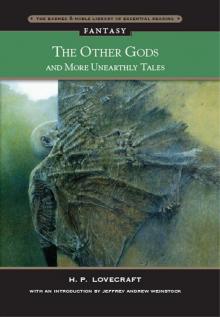 Other Gods and More Unearthly Tales
Other Gods and More Unearthly Tales Lovecraft's Fiction Volume I, 1905-1925
Lovecraft's Fiction Volume I, 1905-1925 The Shadow Out of Time
The Shadow Out of Time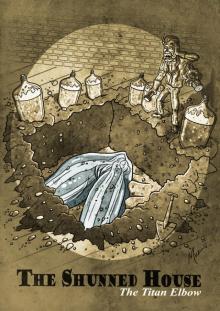 The Shunned House
The Shunned House Lovecraft's Fiction Volume II, 1926-1928
Lovecraft's Fiction Volume II, 1926-1928 The Thing on the Doorstep and Other Weird Stories
The Thing on the Doorstep and Other Weird Stories Dream Cycle of H. P. Lovecraft: Dreams of Terror and Death
Dream Cycle of H. P. Lovecraft: Dreams of Terror and Death Great Tales of Horror
Great Tales of Horror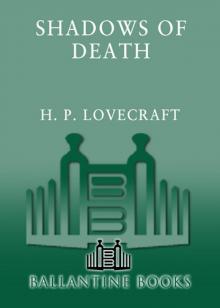 Shadows of Death
Shadows of Death Delphi Complete Works of H. P. Lovecraft (Illustrated)
Delphi Complete Works of H. P. Lovecraft (Illustrated) Waking Up Screaming: Haunting Tales of Terror
Waking Up Screaming: Haunting Tales of Terror H.P. Lovecraft Goes to the Movies
H.P. Lovecraft Goes to the Movies The Road to Madness
The Road to Madness The Complete H.P. Lovecraft Reader (68 Stories)
The Complete H.P. Lovecraft Reader (68 Stories) The Horror in the Museum
The Horror in the Museum Collected Fiction Volume 1 (1905-1925): A Variorum Edition
Collected Fiction Volume 1 (1905-1925): A Variorum Edition Lovecrafts_Fiction, vol.I_1905-1925
Lovecrafts_Fiction, vol.I_1905-1925 Writings in the United Amateur, 1915-1922
Writings in the United Amateur, 1915-1922 H.P. Lovecraft: The Complete Works
H.P. Lovecraft: The Complete Works Collected Fiction Volume 3 (1931-1936): A Variorum Edition
Collected Fiction Volume 3 (1931-1936): A Variorum Edition H.P. Lovecraft: The Complete Fiction
H.P. Lovecraft: The Complete Fiction Collected Fiction Volume 2 (1926-1930): A Variorum Edition
Collected Fiction Volume 2 (1926-1930): A Variorum Edition Yog Sothothery - The Definitive H.P. Lovecraft Anthology
Yog Sothothery - The Definitive H.P. Lovecraft Anthology The Complete H.P. Lovecraft Collection (Xist Classics)
The Complete H.P. Lovecraft Collection (Xist Classics) The Watchers Out of Time
The Watchers Out of Time Eldritch Tales
Eldritch Tales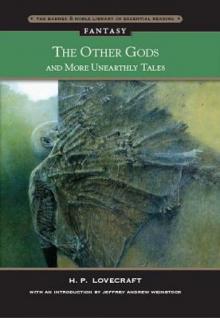 The Other Gods And More Unearthly Tales
The Other Gods And More Unearthly Tales The New Annotated H. P. Lovecraft
The New Annotated H. P. Lovecraft At the mountains of madness
At the mountains of madness Bloodcurdling Tales of Horror and the Macabre
Bloodcurdling Tales of Horror and the Macabre Fossil Lake II: The Refossiling
Fossil Lake II: The Refossiling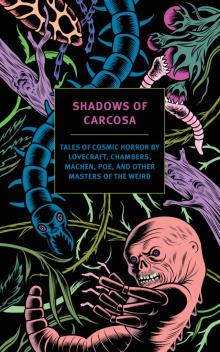 Shadows of Carcosa: Tales of Cosmic Horror by Lovecraft, Chambers, Machen, Poe, and Other Masters of the Weird
Shadows of Carcosa: Tales of Cosmic Horror by Lovecraft, Chambers, Machen, Poe, and Other Masters of the Weird H. P. Lovecraft
H. P. Lovecraft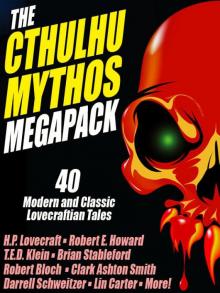 The Cthulhu Mythos Megapack
The Cthulhu Mythos Megapack The Complete H. P. Lovecraft Reader (2nd Edition)
The Complete H. P. Lovecraft Reader (2nd Edition) The Complete Fiction
The Complete Fiction Waking Up Screaming
Waking Up Screaming Transition of H. P. Lovecraft
Transition of H. P. Lovecraft![[1935] The Shadow Out of Time Read online](http://i1.bookreadfree.com/i2/04/12/1935_the_shadow_out_of_time_preview.jpg) [1935] The Shadow Out of Time
[1935] The Shadow Out of Time The Horror Megapack
The Horror Megapack